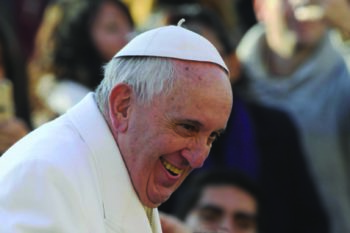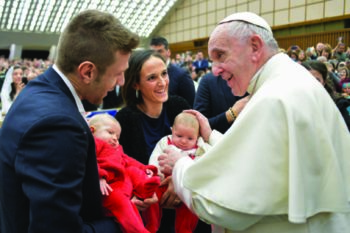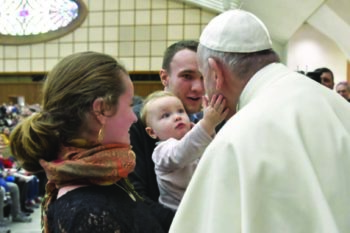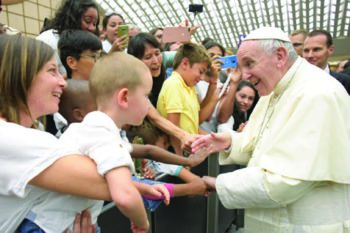Francis Speaks
 The Holy Family of Nazareth
The Holy Family of Nazareth
The term ‘holy’ inserts this family into the realm of holiness, which is a gift of God but, at the same time, is free and responsible adherence to God’s plan. It was so for the family of Nazareth, which was totally open to the will of God. How can we not be amazed at Mary’s docility to the action of the Holy Spirit, who asks her to become the Mother of the Messiah? Because, as every young woman of her time, Mary was about to bring her plan of life into effect, namely, to marry Joseph.
However, when she realised that God was calling her to a particular mission, she did not hesitate to proclaim herself his “handmaid” (See Luke 1:38). Jesus would exalt her grandeur not so much for her role as Mother, but for her obedience to God. Jesus says: “Blessed rather are those who hear the word of God and keep it!” (Luke 11:28), as Mary did. And when she doesn’t understand fully the events that involve her, Mary meditates, reflects and adores the divine initiative in silence. Her presence at the foot of the cross consecrates this total availability.
 Then, in so far as Joseph is concerned, the Gospel does not tell us a single word: he does not speak, but acts by obeying. He is the man of silence, the man of obedience. Matthew (2:13, 19-23) recalls three times this obedience of the just man Joseph, in reference to the flight into Egypt and the return to the land of Israel. Under God’s guidance, represented by the angel, Joseph removes his family from Herod’s threat and saves it. Thus, the Holy Family is in solidarity with all families forced into exile worldwide by repression, violence and war.
Then, in so far as Joseph is concerned, the Gospel does not tell us a single word: he does not speak, but acts by obeying. He is the man of silence, the man of obedience. Matthew (2:13, 19-23) recalls three times this obedience of the just man Joseph, in reference to the flight into Egypt and the return to the land of Israel. Under God’s guidance, represented by the angel, Joseph removes his family from Herod’s threat and saves it. Thus, the Holy Family is in solidarity with all families forced into exile worldwide by repression, violence and war.
Finally, Jesus is the third person of the Holy Family. He is the will of the Father: in him, says Saint Paul, there wasn’t ‘yes’ and ‘no’, but only ‘yes’ (See 2 Corinthians 1:19). And this was shown many times in his life. For instance, the episode in the Temple, when his anguished parents were looking for him, he answered, “Did you not know that I must be in my Father’s house?” (Luke 2:49); his constant repeating, “My food is to do the will of him who sent me” (John 4:34); his prayer in the Garden of Olives, “My Father, if this cannot pass unless I drink it, thy will be done” (Matthew 26:42). All these events are the perfect realisation of the same words of Christ who effectively says, “Sacrifices and offerings you have not desired. Then I said, ‘Lo, I have come to do your will, O God’” (Hebrews 10:5-7; Psalm 40:7-9).
 Mary, Joseph and Jesus: the Holy Family of Nazareth represents a unanimous response to the Father’s will. The three components of this singular family help one another mutually to discover and realise God’s plan. They prayed, worked and communicated.
Mary, Joseph and Jesus: the Holy Family of Nazareth represents a unanimous response to the Father’s will. The three components of this singular family help one another mutually to discover and realise God’s plan. They prayed, worked and communicated.
Our Families
And I wonder: in your family, are you able to communicate or are you like those kids at table, each one with his mobile ’phone while they are chatting? At that table there seems to be a silence as if they were at Mass. But they don’t communicate with one another. We must take up again conversation in the family: fathers, parents, children, grandparents, sisters and brothers must communicate with one another. This is a task to do today. May the Holy Family be the model of our families, so that parents and children support one another in faithfulness to the Gospel, the foundation of the family’s holiness.

We entrust to Mary, Queen of the Family, all the world’s families, especially those tried by suffering and hardship, and we pray for her maternal protection for them.
Source: Adapted from Zenit, 29 December 2019
 Entries(RSS)
Entries(RSS)